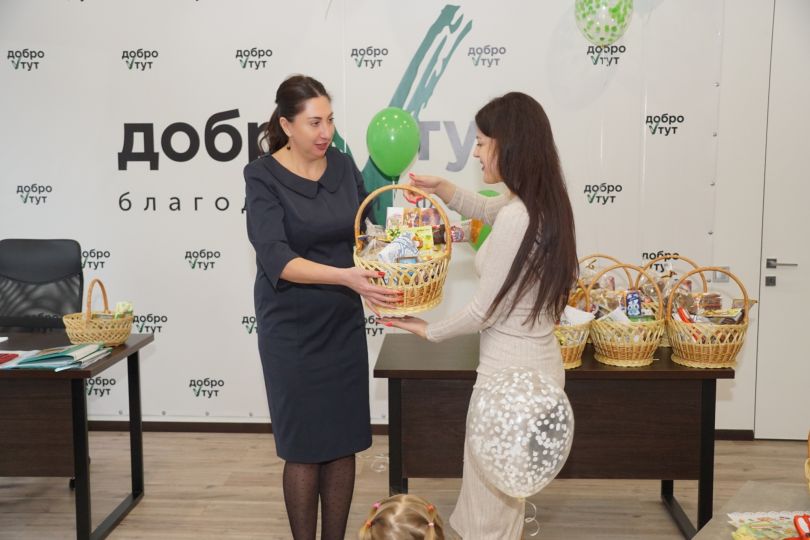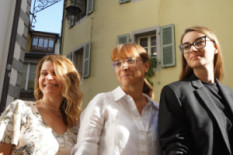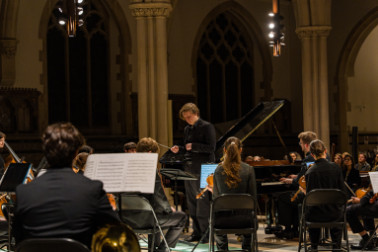We got to know Nadia through the charitable foundation "GoodHere." This is the third story about women whom the foundation helps. We tell about them together with the Yedynna website for women so that more people know about the lives of real
The first one was about Lyudmila Pasha, a woman from Mariupol who became an active volunteer for the foundation. Her story initiated this project. Every day, Lyudmila communicates with displaced people (she dislikes this word, but it has long been part of our reality) from occupied and frontline territories and can share many incredible stories that are impossible not to be shared. The "Edyna" team couldn't ignore her story, so they read another heartfelt and warm narrative about a beautiful woman, her family, the challenges she faces, and the victories she achieves.
Nadia is lovely, intelligent, creative, and even glowing from within. She is sincere and genuine, resembling a heroine from some well-crafted novels or fairy tales. At the beginning of our conversation, I asked about the name of our heroine's daughter. "Alice," she replied. "Like the girl from Wonderland?" I asked. "Exactly!" Nadia quickly responded. A conversation about the hardships Ukrainians face due to the war does not often start with discussions about books, illustrations, and characters. Each personal story is unique, and our interview with Nadia began with a conversation about Alice from Wonderland.
Is your Alice as enchanting as Alice from Wonderland?
Yes (laughs). Even before my daughter was born, my husband and I watched an animated film about Alice. The character stuck with me. We both loved it. So, when Alice was born, I immediately started collecting books for her. In Severodonetsk, I left behind the ones I missed a lot. Three books about Alice with beautiful illustrations.
However, I have some joyful news. I already found and bought one of them. You know, it's a special kind of nostalgia - buying things that were lost. Exactly the ones that were there before. One of them is the book about Alice.
Is it a way to somehow recreate that life?
Yes, it's like an illusion that something can be brought back.
Did you lose everything there?
The apartment is intact, but there's nothing in it. Everything was taken out by the "builders" who break into apartments, claiming it's for "renovation and reconstruction," but they're just looting.
Please tell me how the war started for you.
On the 24th, we were sleeping. We woke up not from explosions but from phone calls. His classmates from Kyiv were calling my husband. I didn't understand why so early, and he didn't even pick up the phone. Then I checked Telegram and saw the news.
And then I told my husband, "The war has started!" He didn't believe it, saying, "Let me sleep, why are you making things up?"
I later talked to people, and it turned out that many of them suspected something like this could happen. But somehow, it didn't seem to concern me at all. I was completely absorbed in work, family, and caring for my daughter. I didn't read the news at all. And suddenly, this.
Alice was only a year old, you know. And when you have a little child, the level of anxiety is much higher. I was in a state of panic.
My husband was convinced that everything would pass quickly and didn't want to leave anywhere. But I experienced shelling in Lysychansk in 2014, so I immediately had associations.
With each passing day, it became louder. But we went to the basement only once, about four days after the war began. Explosions were happening, and we grabbed our daughter and walked down from the third floor, but there were windows, glass. I understand that maybe it would have been better to wait it out. Our building didn't have a basement, so we ran through the courtyard to another building under the bombardment.
It was dark, damp, and dusty, with only one exit. I sat with my child in the hallway, and my panic grew. Then I told my husband I wouldn't go there with our daughter. It's a real pity that in the frontline city, they haven't built bomb shelters all these years. There was nowhere to hide.

And you decided it was time to leave? Where did you head to?
It was a coincidence that my husband's aunt, who had been living in Istanbul for a long time, was in the city then. She came to visit relatives shortly before the war began. So she decided to leave and took me with her. It was March 2nd. So, I was in the city during wartime for only a week.
How was your journey?
The road was terrible, to be honest. We arrived at Lysychansk railway station. I have not had very pleasant memories associated with railway stations since 2014. I vividly remember standing in Luhansk with a cat in a carrier while explosions were happening on both sides. But it seems to me that I wasn't so worried back then. But this time, with a child, with family (my husband and his parents went to see us off), under explosions... I was in a panic.
We waited for the train outside on the platform, and explosions were happening around... We traveled for about 40-45 hours to the Polish border in complete darkness because all windows were covered and phones were turned off. I couldn't even change a diaper.
Then someone stole my bag with all the documents at my aunt's railway station in Poland, so we stayed in Krakow for a week until we got temporary ones. And then we headed to Prague.
We saw our people everywhere we went... Women with children, animals, and elderly people on all the trains.
From Prague, we flew to Istanbul.
I constantly felt like I was in a movie. Everything was too unreal.
And in Istanbul, were you able to breathe a little?
Well, how to put it. We arrived in the evening, and the next day, they called an ambulance for me.
At the hospital, they ran all the tests, and it turned out that I was physically healthy. But for a day, I was vomiting, trembling, and couldn't get up. For the family that took me in, it was also a trial. But everything was fine when I told them the worst was over.
What impressed you the most in Istanbul?
Probably the situation with the banking cards. Back home, I used my phone for payments everywhere. When we left, I took no physical cards with me. But there, most shops still used old payment systems. I couldn't pay with my phone, and I couldn't even withdraw money from my account. Only my relatives and the possibility of ordering goods online saved me. I relied on my relatives a lot for many things there. I find it hard to imagine how other Ukrainians are getting settled there.
When did you decide to return to Ukraine? When things calmed down a bit here?
No, we came back when there was still no calm in Dnipro. But I couldn't live without my family anymore. It was tough for me to realize that my daughter only saw her father through video calls. I really wanted to come back.
And when did your family decide to leave the city?
They held on until April. Once, a shell landed very close to our car, and then my husband understood that soon we wouldn't have anything to drive. By that time, there was no more evacuation transport available. So he took the most important things: our German Shepherd, the cat, one of my camera lenses, and his PlayStation (laughs). His parents and my mother were with him when they drove to Lysychansk. They drove amid the sounds of explosions, but everything turned out relatively okay.
And how is it in Dnipro?
We all live in a small house (45 sq. m), it's private, but it's considered a dormitory. We can't find anything larger in terms of space. When people hear that we have a German Shepherd, they immediately refuse. I can't convince them that we have a well-behaved and tidy dog. His name is Wright, and he's nine years old. He's very calm and well-behaved. Of course, it's really sad that settling in your homeland is harder than abroad. My husband and mother found jobs, so we are somewhat tied to the city.
And how is your work?
I've started doing photography bit by bit. When my mom has a day off, I leave my daughter with her and work. In my hometown, I was known for large-scale women's photo projects. I made a living from it. In Dnipro, I'm gradually doing photoshoots. I often do family shoots with genuine emotions, without posing; I love those smiles. I also tried underwater photography. Although I still need to invest a lot to restore my business entirely.
 Nadia's pre-war project
Nadia's pre-war project
I miss my hometown. In the past, it was a small town with ample opportunities. It was very comfortable to live there. I consciously chose it as an adult. I moved from Lysychansk to Severodonetsk because of love. And I really wish to return there.
 Nadia's pre-war project
Nadia's pre-war project
How did you learn about the "DobroTUT" charitable foundation in Dnipro?
In the stories of one of my clients from Severodonetsk, I saw her painting beautiful pictures. I asked her where exactly, and she sent me the foundation's page. I contacted them and eventually attended the "Calm Mom - Calm Child" master class.
It truly inspired me. It was amazing. They give you a canvas, paints, and time and explain everything in detail. I love painting, although I rarely find time for it. But here, I had this opportunity...
This was the first foundation in Dnipro that doesn't just give out food or items (although that's also much needed) but offers experiences! Also, I recently attended Margarita Sichkar's master class, which I loved because everything was clear and concise.
We also won an Easter basket. Before the holiday, DobroTUT organized a giveaway on their page, and I decided to participate. Easter is a significant holiday for us, as we used to bake many traditional cakes and beautifully decorate eggs as a family. However, due to the war, we haven't had the chance to do it for two years now. On the first Easter, I was in Turkey, where they don't celebrate it. And this year, we just didn't have a place to bake. So, this basket brought a special mood and greatly delighted all of us.

You know, it's so important when you can receive something more than just necessities for survival. It's very inspiring; it feels like everything is alright, just as it used to be.
The foundation is a group of warm-hearted people. Ludmyla Pasha is its driving force; her energy is always visible and felt positively. The fact that she is also a displaced person plays a significant role because Ludmyla understands us best. She knows what we need and tries to provide it.
They also have a wonderful campaign where children can choose new quality items at the Waikiki store. I bought my little daughter some lovely summer dresses. She's already a fashionista at two years old!
What is most important for you in this campaign besides the items?
You know, the items are very important. New, beautiful things that you can choose yourself. When I ask for help, I usually receive used items, not all being in good condition. But I want to dress my child in something clean, without stains, and in something beautiful.
You understand, in our previous life, we could afford many things. And now, when you can't, it makes you realize everything has changed. It's also about the illusion of a normal life, but sometimes it's essential to maintain that illusion. It's a crucial moment for stabilizing the psyche and making things easier.
In this campaign, it's very important that children get to choose the items themselves. My child is still very young, but older children can make their own choices. It's incredibly important for them because parents usually buy the most essential and practical things with limited resources. Who cares about Spiderman on a white background! But here, the children can choose what they want. It brings them real joy and gives them a sense of a normal childhood.
Moreover, the foundation offers many interesting activities for children: cinema, opera, circus, and planetarium. We haven't attended yet, but I'm so happy seeing the photos and videos of happy little ones.
Dnipro isn't exactly peaceful. How do you cope with it all?
I still have this fear for my child, which causes strong anxiety. I act calmly on the outside and hug my daughter close to me. But deep inside, it's still challenging. Although I've gradually started getting used to it. However, when I returned from Turkey, I wanted to leave again a few times.
But my husband works here. My mother has a job. Of course, life is more important, but how can we survive without work and with a little child? So, whether I like it or not, I also hold on to a family member's work.
What do you dream of?
Like most Ukrainians now, my most cherished dream is simple: peaceful skies over our heads, our own home, and a happy and healthy family. Safety. Safety above all else.
We believe that it will happen soon. And while I hope for that, I sincerely wish that good people read about the well-behaved nature of your dog, Wright and that you find a wonderful place to live for yourself and your family.







